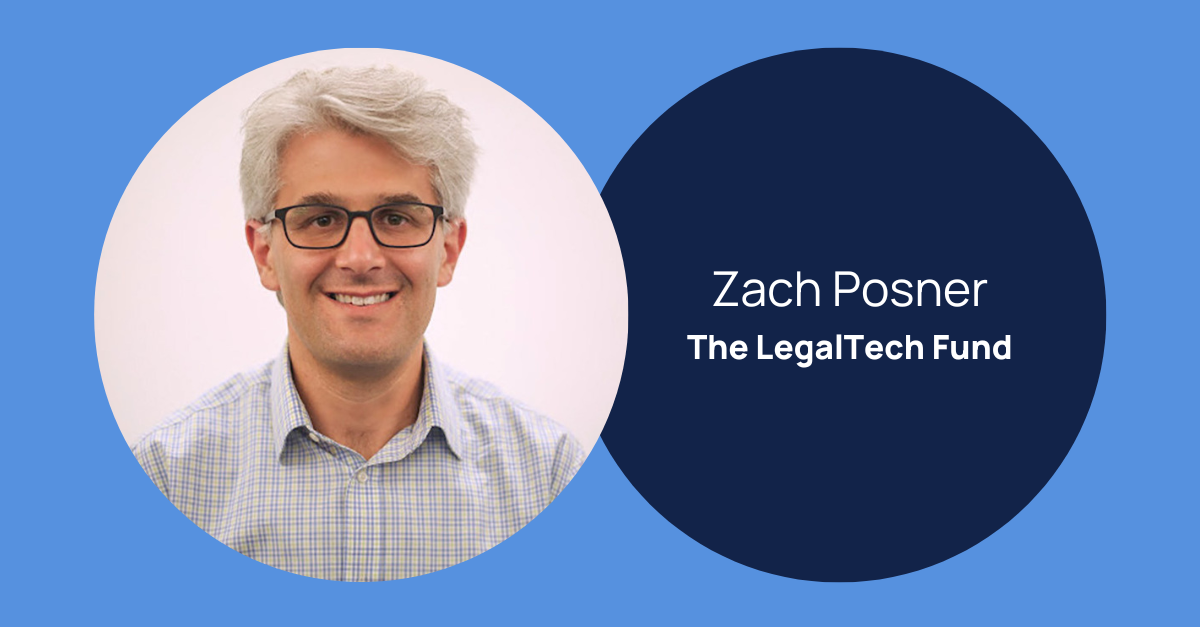Zach Posner of The LegalTech Fund: Investing in the Future of Law
Author: Matt Francis

Zach Posner, co-founder and managing partner at The LegalTech Fund discusses how legal tech will not just transform the practice of law but business as we know it. He also shares his thoughts on the importance of law firms adopting new technologies like artificial intelligence.
Q: Please tell us about yourself and your background.
A: I’m Zach Posner, co-founder and managing partner at The LegalTech Fund. My career began in PriceWaterhouseCoopers’ financial due diligence group before moving to Insight Partners, a global venture fund. Eventually, I transitioned to the operational side and co-founded a company in the K-12 education sector. Our aim was to assist teachers in managing classroom data, and our product reached approximately 12 million children worldwide, culminating in an acquisition by McGraw Hill.
This experience led to an epiphany regarding the need for ensuring school vendors maintained stringent data security standards, which became the focus of my next venture. An unexpected pivot in our strategy eventually led us to service law firms, who also had the same need. This shift coincided with a surge in the mid-2010s that highlighted the legal industry’s burgeoning interest in innovation. Witnessing the dynamic evolution of legal tech, I began angel investing, ultimately leading to the establishment of The LegalTech Fund in 2021.
Q: What is The LegalTech Fund and where do you focus your investments?
A: The LegalTech Fund is dedicated to investing in companies that are transforming the world of law. We see the legal sector as a vast arena with significant opportunities for technological advancements. Our investment focus spans three primary areas: law firms, their clients, and consumers.
For law firms, we identify immense potential for automation in various operational aspects, including client engagement, e-discovery, and document analysis. When considering clients, our attention turns to software solutions tailored for corporate legal teams or general counsels, as well as business units within companies. Lastly, we address the consumer segment of legal tech, recognizing a substantial unmet need in the market. The median attorney hourly rate is $364/hr, but the median hourly wage in America is at $19/hr. A significant portion of the population remains unable to afford legal services and face unaddressed legal challenges.
Through our investments, we aim to bridge these gaps by supporting innovations that make legal assistance more accessible and efficient for all stakeholders. All three of these areas will be transformed due to large language models and advancements in AI.
Q: Would you say that because the practice of law impacts so many business functions, that legal tech inherently blurs the line between many traditional software segments?
A: Absolutely, the realm of legal technology frequently intersects with numerous traditional software categories, reflecting its broad impact on various business functions. Taking the example of Pattern Data, a company in which we have invested, illustrates this point well. Some may view Pattern Data primarily as a health tech entity due to its significant work with medical records. However, its primary users are mass tort attorneys engaged in major litigations, making it fit squarely in the legal sector.
Our investment strategy is such that legal tech will play a pivotal role across various industries. Hence, when evaluating potential investments, we look for solutions that offer substantial benefits to law firms, their clients, and consumers alike, recognizing the transformative impact these technologies can have on the legal landscape and beyond.
Q: What are you seeing as hotbeds of innovation in the legal tech space?
A: When we started The LegalTech Fund, our primary focus was on enhancing workflows within the legal industry, a sector historically slow to adopt technology. This drove our initial investments. Recently, the emergence of AI has significantly accelerated these advancements. A report by Goldman Sachs highlighted that up to 44% of legal work could potentially be automated using artificial intelligence and large language models (LLMs), signaling a substantial shift in the industry’s direction.
This is why we believe the current opportunity lies more in utilizing LLMs and AI to enhance existing workflow technologies, essentially turbocharging them. But as with any emerging tech, it is not without its pitfalls. For example, we see this often at legal conferences where many law firms claim they’re using ChatGPT to write claims. A quick web search will reveal how several law firms have found themselves in serious trouble by using this technology improperly. I believe Bill Gates once remarked that people tend to overestimate the changes that will happen in a year and underestimate the changes that occur over a decade. This sentiment aptly describes the current state of AI technology within the legal sector. The potential for transformative change is immense, but it can unfold over a longer timeline.
Q: With all you’re seeing in the legal space with the use of A.I., what would be your advice for law firms looking to implement AI solutions?
A: Experiment. Engage with technologies that seem “interesting”, explore their potential and fail fast. AI offers a broad spectrum of capabilities that can significantly expand your team’s understanding of what’s possible. However, it’s crucial to recognize that some AI technologies may not yet be fully mature, which underscores the importance of experimenting and running parallel processes to familiarize your team with these tools.
The legal industry must accelerate its adoption of technology. The trajectory of technological evolution indicates a clear path forward, and the sooner a law firm’s culture can adapt to incorporate new technologies, the better. Encouraging a culture of exploration and open debate about the possibilities AI and related technologies offer is essential. By staying informed and proactive in experimenting with emerging technologies, law firms can ensure they remain competitive and avoid being left behind in an era where innovation progresses rapidly, often transforming practices within just a few years.
back to all news

